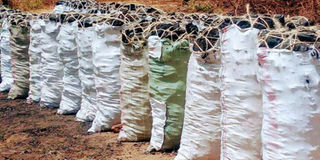East African charcoal, fish, and stealing a president’s wire mesh

Sacks of charcoal have been impounded in Kajiado County. PHOTO | KITAVI MUTUA | NATION MEDIA GROUP
What you need to know:
Kenya’s solution to its environmental crisis is, therefore, likely to deepen Uganda’s
The exports to Kenya happen as a result of failure to protect forests.
As rivers and lakes dry up, are polluted or simply overfished, commercial fish farming is soaring, especially in Kenya and Uganda.
Last week I travelled across part of western Kenya and deep into eastern Uganda.
My Kenyan travelling companion soon complained that the charcoal ban by governors in eastern Kenya, in a bid to stop the destruction of forests, had “caused serious problems for people who depend on charcoal”.
Then he added: “We have only been saved by charcoal imports from Uganda.”
I froze, because Uganda does not have surplus forest to cut for charcoal. In fact, its deforestation rates are higher than Kenya’s.
Indeed, later, as we were travelling in eastern Uganda, he remarked: “I am looking around, and I don’t see the trees Ugandans are cutting down to make the charcoal they are exporting to Kenya.”
PROTECT FORESTS
The exports to Kenya happen as a result of failure to protect forests. Kenya’s solution to its environmental crisis is, therefore, likely to deepen Uganda’s.
Nevertheless, there were some other intriguing insights offered by this charcoal drama. Among other things, it illustrates how actions taken by county governors — not by the national government in Nairobi — can have an impact on neighbouring countries.
Further, it points to how survival responses have become regional issues.
Uganda, for example, has done well out of food exports to the region. In February last year, The EastAfrican reported: “In the past three months, Uganda has exported more than 28,000 tonnes of maize worth $14 million to the region, as countries such as Burundi struggle with the highest maize prices recorded in recent times.
FOOD INSECURITY
“This year, Uganda has sold 13,312 tonnes of maize to its neighbours with the bulk going to Tanzania (7,240 tonnes), followed by Rwanda (3,566 tonnes), then Kenya (2,506 tonnes) as food insecurity reaches alarming levels across various parts of the region.”
Good business for Uganda farmers, yes, but to meet the growing regional demand, in several parts of Uganda, small-scale farmers have invaded wetlands in record numbers to grow rice and, in some areas, maize.
Soon, there might be an ecological price to pay.
This is a signal that we have reached a point where energy, agricultural (or food) and environmental policy in East Africa need to be made regionally to manage these unintended cross-border consequences.
POLICING
In the countries, we see some rather bizarre developments.
As rivers and lakes dry up, are polluted or simply overfished, commercial fish farming is soaring, especially in Kenya and Uganda.
However, while in Kenya a lot of the fish farming, especially in the central region, is done in ponds, in Uganda it’s done along the shores of the fish-depleted Lake Victoria.
And while traditional farming was democratic, as most fishermen were generally poor but still access the waters, fish farming is for the well-off who can invest in cages, fish feeds and security.
This shift of power, has brought with it new forms of policing fish on land. The rich and powerful can mobilise the police to ensure no one steal and sells fish from their farms.
DIMINISH
Working from the assumption that the catch has diminished in Lake Victoria, in some parts of Uganda near the lucrative fish farms today, if “fish patrols” catch a lowly peasant with a big tilapia roasting over the fire in his kitchen, he is considered to have stolen it and could be arrested.
To play safe, if some small fisherman catches a big fish, someone alleged, he throws it back into the water and only takes home to eat the tiny ones “that don’t look like they are from the big people’s fish farms”.
Additionally, if the small people want to raise fish, they are safer farming an inferior variety that can in now way be mistaken to have come from a big man’s pond.
* * *
And, talking of big men’s farms, Uganda’s President Yoweri Museveni fancies himself as a cattle man. He owns two huge dairy farms.
Recently, some bold thieves went and stole all the wire mesh around his massive farm in central Uganda.
RAID
His Excellency was not too pleased. A battalion of the presidential guard was ordered to raid the vast second-hand parts market in Kampala called “Kisekka Market” to recover The Chief’s wire mesh.
The soldiers seized all second-hand wire mesh — both those that “resembled” the stolen one as well as those that didn’t look like they were related to it.
Don’t mess with the President’s mesh.
Mr Onyango-Obbo is the publisher of Africa data journalism site Africapedia.com and explainer Roguechiefs.com. Twitter: @cobbo3





